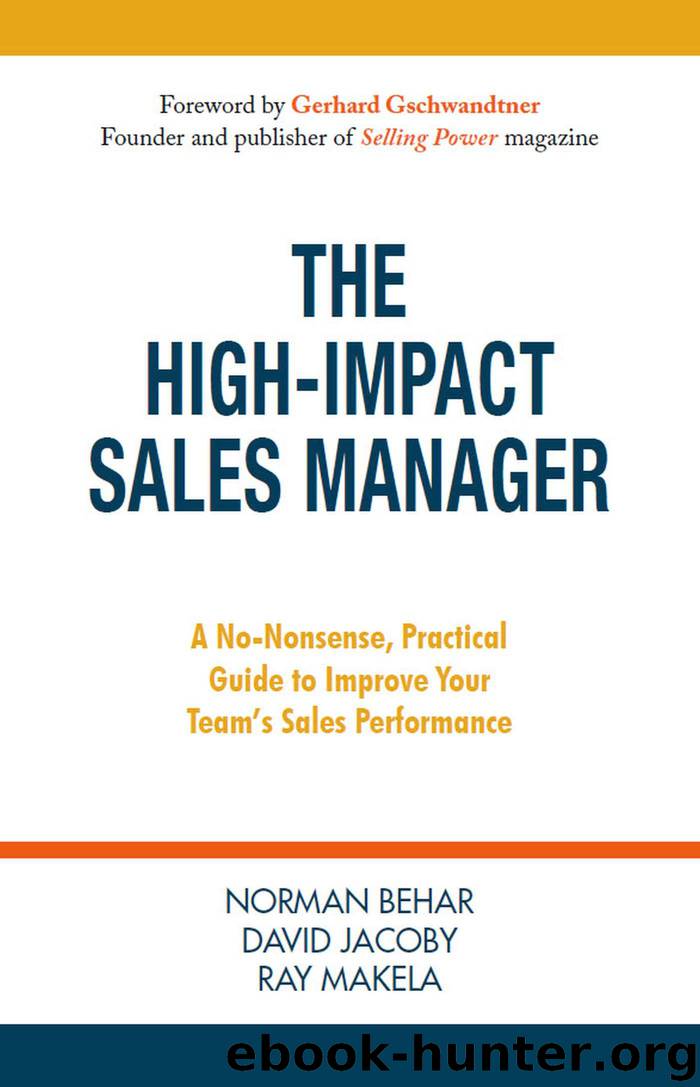The High-Impact Sales Manager: A No-Nonsense, Practical Guide to Improve Your Team's Sales Performance by Norman Behar & David Jacoby & Ray Makela

Author:Norman Behar & David Jacoby & Ray Makela
Language: eng
Format: mobi
Tags: General Fiction
Publisher: Sales Readiness Group
Published: 2016-05-15T14:00:00+00:00
Figure 5.1: Three A’s Framework
1. Ask First
The purpose of asking questions is to promote self-discovery by the salesperson. Salespeople will take more ownership of changing their behavior if they feel they are discovering problems and solutions on their own. To achieve this outcome, ask open-ended questions and allow ample opportunity for salespeople to reflect and respond. By asking questions, you will also gain a better sense for their perspective which, when it comes to coaching, may be more valuable than your own.
2. Actively Listen
Listening is essential to a collaborative sales coaching mindset. Unfortunately, many sales managers are poor listeners—they feel like they need to do all the talking to get their point across. By contrast, most successful sales coaches excel at “active listening,” which means they are fully focused on the salesperson.
Concentrate on what the salesperson is saying, and tune in to such nonverbal communication signals as tone of voice and body language. Don’t simply wait for your turn to speak; listen with the intent to understand what the other person is saying.
When you do respond, continue to follow the principles of active listening by asking questions to clarify meaning and confirm understanding—and paraphrasing what the salesperson has just said in order to communicate your understanding to the salesperson.
3. Assume Best Intentions
The tone of sales coaching conversations should be congenial and open-minded, not punitive or retaliatory. Assume your salespeople want to improve their skills; this assumption helps create a positive environment in which salespeople feel comfortable acknowledging shortcomings and are motivated to improve. Remember, part of their growth involves allowing them to make mistakes. Resist the temptation to pass judgment before you understand their intent.
Download
This site does not store any files on its server. We only index and link to content provided by other sites. Please contact the content providers to delete copyright contents if any and email us, we'll remove relevant links or contents immediately.
Influence: The Psychology of Persuasion by Robert B. Cialdini(4782)
The Miracle Morning by Hal Elrod(4712)
The Hacking of the American Mind by Robert H. Lustig(4375)
Pre-Suasion: A Revolutionary Way to Influence and Persuade by Robert Cialdini(4224)
Unlabel: Selling You Without Selling Out by Marc Ecko(3658)
Ogilvy on Advertising by David Ogilvy(3604)
Hidden Persuasion: 33 psychological influence techniques in advertising by Marc Andrews & Matthijs van Leeuwen & Rick van Baaren(3552)
Purple Cow by Seth Godin(3197)
Who Can You Trust? by Rachel Botsman(3129)
Kick Ass in College: Highest Rated "How to Study in College" Book | 77 Ninja Study Skills Tips and Career Strategies | Motivational for College Students: A Guerrilla Guide to College Success by Fox Gunnar(3118)
The Marketing Plan Handbook: Develop Big-Picture Marketing Plans for Pennies on the Dollar by Robert W. Bly(3047)
This Is Marketing by Seth Godin(3021)
I Live in the Future & Here's How It Works by Nick Bilton(2993)
The Power of Broke by Daymond John(2975)
The Tipping Point by Malcolm Gladwell(2914)
Building a StoryBrand by Donald Miller(2896)
The 46 Rules of Genius: An Innovator's Guide to Creativity (Voices That Matter) by Marty Neumeier(2840)
Draw to Win: A Crash Course on How to Lead, Sell, and Innovate With Your Visual Mind by Dan Roam(2783)
Market Wizards by Jack D. Schwager(2696)
